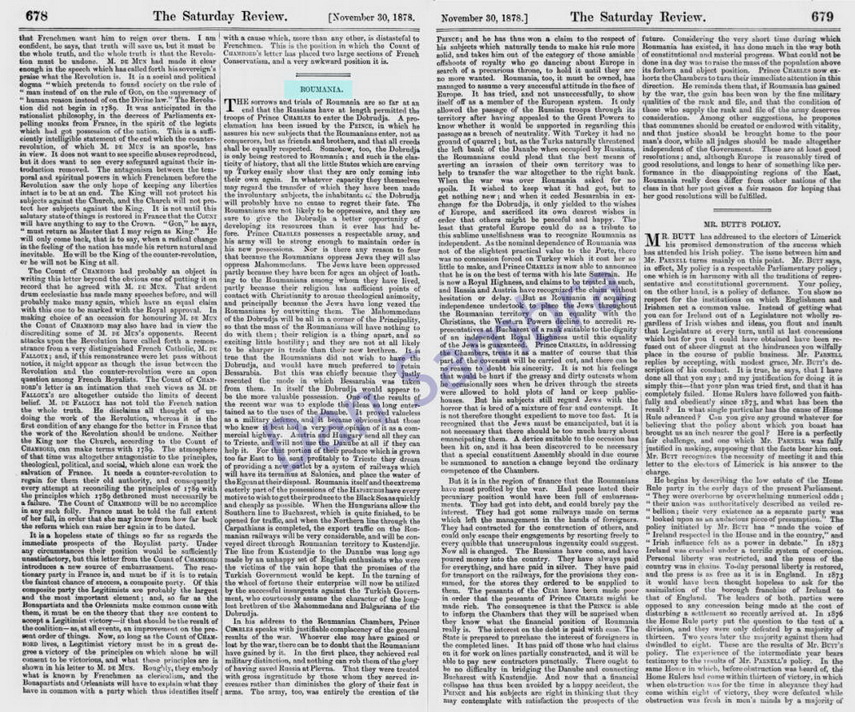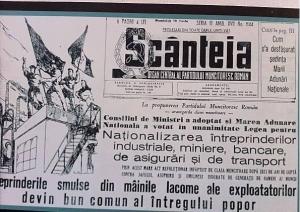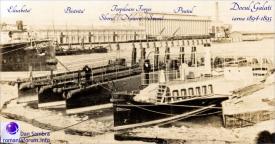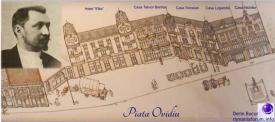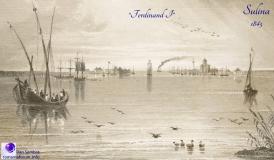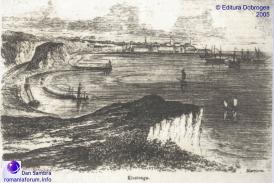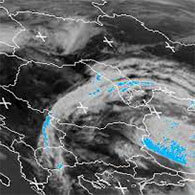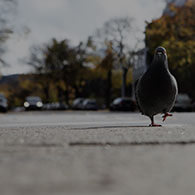Dobrogea - File de istorie 14 noiembrie 2017 - Ziua Dobrogei (galerie foto)
Dobrogea - File de istorie: 14 noiembrie 2017 - Ziua Dobrogei (galerie foto)
16 Nov, 2017 00:00
ZIUA de Constanta
 9934
Marime text
9934
Marime text
 9934
Marime text
9934
Marime text

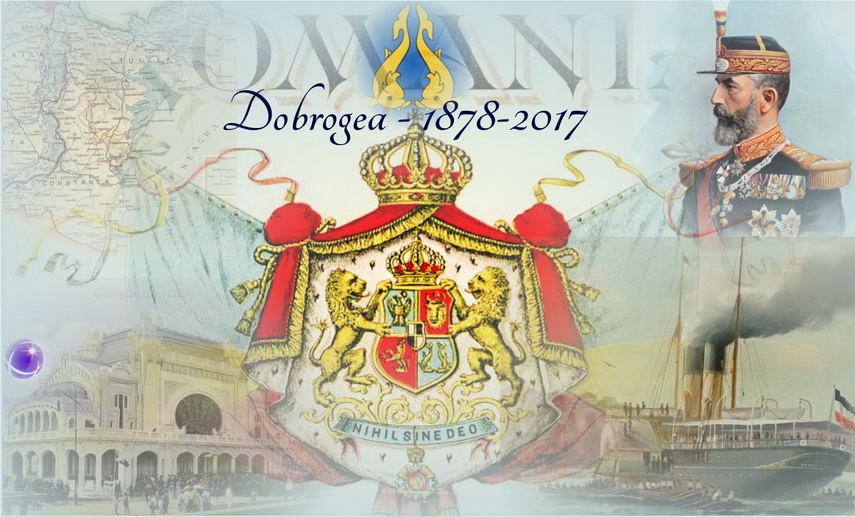
[Cap. 1] Dobrogea - în momentul alipirii la România - 1878, 30 noiembrie [1]
Alăturat, un articol din presă britanică din acel moment, care descrie pe larg situaţia geopolitică a regiunii în noiembrie 1878; se referă la Prinţul Carol şi la alipirea Dobrogei la România.
„Roumania.
THE sorrows and trials of Roumania are so far at an end that the Russians have at length permitted the troops of Prince CHARLES to enter the Dobrudja.
A proclamation has been issued by the PRINCE, in which he assures his new subjects that the Roumanians enter, not as conquerors, but as friends and brothers, and that all creeds shall be equally respected.
Somehow, too, the Dobrudja is only being restored to Roumania; and such is the elasticity of history, that all the little States which are carving up Turkey easily show that they are only coming into their own again. In whatever capacity they themselves may regard the transfer of which they have been made the involuntary subjects, the inhabitants of the Dobrudja will probably have no cause to regret their fate.
The Roumanians are not likely to be oppressive, and they are sure to give the Dobrudja a better opportunity of developing its resources than it ever has had before. Prince CHARLES possesses a respectable army, and his army will be stron enough to maintain order in his new possessions.
The Mahommedans of the Dobrudja will be all in a. corner of the Principality, so that the mass of the Roumanians will have nothing to do with them; their religion is a thing apart, and so exciting little hostility; and they are not at all likely to be sharper in trade than their new brethren. It is true that the Roumanians did not wish to have the Dobrudja, and would have much preferred to retain Bessarabia. But this was chief! because they justly resented the mode in which Bessarabia was taken from them.
In itself the Dobrudja would appear to be the more valuable possession“.
„Tristeţea şi încercările prin care a trecut şi trece România au ajuns acum la un sfârşit, în momentul în care ruşii au permis în cele din urmă ca trupele prinţului CAROL să intre în Dobrogea.
O proclamaţie a fost emisă de PRINŢ [n.n. Carol], prin care el asigură pe noii săi concetăţeni că românii intra nu în calitate de cuceritori, ci ca prieteni şi fraţi, şi că toate religiile vor fi respectate în mod egal.
De fapt, Dobrogea nu este decât redată României; şi istoria confirmă încă o dată că toate statele mici care au fost ocupate de Turcia arată cu uşurinţă că ele vin din nou în propria lor matcă. Indiferent de felul transferului pe care îl consideră ei înşişi, transfer prin care ei au fost făcuţi subiecţi involuntari, locuitorii Dobrogei probabil că nu vor avea motive să-şi regrete soarta.
Nu este probabil ca românii să fie opresivi, şi vor oferi Dobrogei cu siguranţă o oportunitate mai bună de a-şi dezvolta resursele decât oricând până în acest moment. Prinţul CAROL posedă o armată respectabilă, iar armata lui va fi suficientă pentru a menţine ordinea în noile sale posesiuni.
Mahomedanii din Dobrogea vor fi toţi într-un colţ al Principatului, astfel încât masa românilor nu va avea nimic de a face cu ei; religia lor este un lucru separat, şi aşa provocând o ostilitate redusă; şi nu este probabil sa fie mai buni în comerţ ca noii lor concetăţeni.
Este adevărat că românii nu au dorit să aibă Dobrogea şi ar fi preferat mai mult să-şi păstreze Basarabia. Dar asta este în primul rând pentru că ei sunt nemulţumiţi de modul în care Basarabia le-a fost luată.
De fapt, Dobrogea ar părea sa fie o posesiune mai valoroasă“.
Autorul continuă:
„One of the results of the recent war was to explode the ideas so long entertained as to the uses of the Danube. It proved valueless as a military defence, and it became obvious that those who knew it best had a very poor opinion of it as a commercial highway.
Austria an Hungary send all they can to Trieste, and will not use the Danube at all if they can help it. For that portion of their produce whichis grown too far East to be sent profitably to Trieste they dream of providing a new outlet by a system of railways which will have its terminus at Salonica, and place the water of the Egean at their disposal. Roumania itself and the extreme easterly part of the possessions of the HAPSBURGS have every motive to wish to get their produce to the Black Sea as quickly and cheaply as possible.
When the Hungarians allow the Southern line to Bucharest, which is quite finished, to be opened for traffic, and when the Northern line through the Carpathians is completed, the export traffic on the Roumanian railways will be very considerable, and will be conveyed direct through Roumanian territory to Kustendjie“.
În traducere:
„Unul dintre rezultatele războiului recent a fost ca el să contrazică ideile ce existau de atât de mult timp cu privire la folosirea Dunărei. Dunărea s-a dovedit a fi lipsită de valoare pentru o apărare militară şi a devenit evident că cei care au cunoscut-o cel mai bine aveau o părere foarte slabă despre ea ca un traseu comercial.
Austria şi Ungaria trimit tot ce pot [n.n. exportă] la Trieste şi nu vor folosi deloc Dunărea dacă se poate. Pentru acea parte a producţiei lor care a crescut prea departe spre est pentru a fi trimisă în mod eficient spre Trieste, ei visează să ofere o nouă ieşire printr-un sistem de căi ferate care să aibă terminusul la Salonic şi să aibă la dispoziţie Marea Egee.
România însăşi şi partea estică extremă a posesiunilor HAPSBURGS (n.n. casa regală Habsburgs, Austria] au toate motivele să dorească ca produsele lor să ajungă la Marea Neagră cât mai rapid şi mai ieftin posibil.
Când maghiarii vor permite liniei sudice spre Bucureşti [n.n. cale ferată], care este aproape finalizată, să fie deschisa circulaţiei şi atunci când linia nordica prin Carpaţi [n.n. cale ferată] este terminată, traficul de export pe căile ferate româneşti va fi considerabil şi va avea loc direct prin teritoriul românesc catre Kustendjie“.
Autorul continuă:
„The line from Kustendjie to the Danube was long ago made by an unhappy set of English enthusiasts who were the victims of the vain hope that the promises of the Turkish Government would be kept. In the turning of the wheel of fortune their enterprise will now be utilized by the successful insurgents against the Turkish Government, who courteously assume the character of the long-lost brethren of the Mahommedans and Bulgarians of the Dobrudja.
In his address to the Romanian Chambers, Prince CHARLES speaks with justifiable complacenc of the general results of the war. Whoever else may ave gained or lost by the war, there can be to doubt that the Roumanians have gained by it.
In the first place, they achieved real military distinction, and nothing can rob them of the glory of having saved Russia at Plevna. That they were treated with gross ingratitude by those whom they served increases rather than diminishes the glory of their feat in arms. The army, too, was entirely the creation of the PRINCE; and he has thus won a claim to the respect of his subjects which naturally tends to make his rule more solid, and takes him out of the category of those amiable offshoots of royalty who go dancing about Europe in search of a precarious throne, to hold it until they are no more wanted“.
În traducere:
„Linia de la Kustendjie până la Dunăre a fost făcută de mai mult timp de un grup nefericit de entuziaşti englezi care au fost victimele speranţei zadarnice ca Guvernul Turc va a respecta promisiunile.
Într-o întorsătură a norocului, întreprinderea lor va fi acum utilizată cu succes de insurgenţi împotriva guvernului turc, care îşi asumă amabil rolul fraţilor pierduţi de mult timp ai mahomedanilor şi ai bulgarilor din Dobrogea.
În cuvântul său adresat Camerelor Române, prinţul CAROL vorbeşte cu o satisfacţie justificată de rezultatelor generale ale războiului. Indiferent de orice altceva ce ar fi putut să fie câştigat sau pierdut prin acest război, nu poate fi nicio îndoiala că românii au câştigat prin el.
În primul rând, ei au obţinut o distincţie militară reală şi nimic nu le poate lua gloria salvării Rusiei la Plevna. Faptul că au fost trataţi cu mare ingratitudine de către cei pe care i-au ajutat creşe mai degrabă decât diminuează gloria faptei lor de arme.
Armata, de asemenea, a fost în întregime creaţa Prinţului [n.n. Carol] şi astfel el a câştigat dreptul de a fi respectat de supuşii săi; lucru care, în mod natural, tinde să facă conducerea sa mai solidă şi îl scoate din categoria acelor nobili regali care «dansează» prin Europa în căutarea unui tron precar, pe care să îl ţina până când nu mai sunt doriţi“.
Autorul, în continuare:
„Roumania, too, it must be owned, has managed to assume a very successful attitude in the face of Europe. It has tried, and not unsuccessfully, to show itself off as a member of the European system. It only allowed the passage of the Russian troops through its territory after having appealed to the Great Powers to know whether it would be supported in regarding this passage as a breach of neutrality.
With Turkey it had no ground of quarrel; but, as the Turks naturally threatened the left bank of the Danube when occupied by Russians, the Roumanians could plead that the best means of averting an invasion of their own territory was to help to transfer the war altogether to the right bank.
When the war was over Roumania asked for no spoils. It wished to keep what it had got, but to get nothing new; and when it ceded Bessarabia in exchange for the Dobrudja, it only yielded to the wishes of Europe, and sacrificed its own dearest wishes in order that others might be peaceful and happy.
The least that grateful Europe could do as a tribute to this sublime unselfishness was to recognize Roumania as independent. As the nominal dependence of Roumania was not of the slightest practical value to the Ports, there was no concession forced on Turkey which it cost her so little to make, and Prince CHARLES is now able to announce that he is on the best of terms with his late Suzerain.
He is now a Royal Highness, and claims to be treated as such, and Russia and Austria have recogized the claim without hesitation or delay“.
În traducere:
„De asemenea, trebuie să se recunoască faptul că România a reuşit să-şi asume o atitudine foarte reuşită în faţa Europei. A încercat, şi nu fără succes, să se confirme ca membru al sistemului european. A permis trecerea trupelor ruseşti pe teritoriul său, doar după ce a făcut apel la marile puteri ca ele să confirme dacă considera această trecere de trupe ca o încălcare a neutralităţii.
Cu Turcia nu avea niciun motiv de ceartă; dar, pe măsură ce turcii au ameninţat în mod normal malul stâng al Dunării când au fost ocupaţi de ruşi, românii au putut să argumenteze că cel mai bun mijloc de a evita o invazie pe propriul lor teritoriu a fost de a ajuta la transferul războiului în întregime pe malul drept al Dunării.
Când războiul s-a încheiat, România nu a cerut nicio recompensa / pradă. Dorea să păstreze ceea ce avea şi nu a cerut sa primească nimic nou; când a cedat Basarabia în schimbul Dobrogei, ea a cedat numai dorinţelor Europei şi şi-a sacrificat propriile dorinţe, pentru ca ceilalţi să fie paşnici şi fericiţi.
Cel mai mic lucru pe care o Europa recunoscătoare a putut sa-l facă, ca un tribut adus acestui sacrificiu sublim, a fost recunoaşterea României ca stat independent. Deoarece dependenţa nominală a României de Turcia nu a avut nici cea mai mică valoare practică pentru Poarta, această independenţă nu a fost o concesie forţată pentru Turcia. Ea a costat-o atât de puţin sa o facă, iar prinţul CAROL este acum în măsură să anunţe că este în cele mai bune relaţii cu ultimul său Suzeran.
El este acum Alteţa Regală şi cere sa fie tratat ca atare, iar Rusia şi Austria au recunoscut acest titlu fără ezitare sau întârziere“.
[Cap. 2] 1880, martie: O scurtă descriere a Dobrogei: „Province of the Dobrudscha“ [2]
„As the province of Dobrudscha - ceded to Roumania in exchange for Bessarabia - is likely to increase in importance, and, in time, become a valuable acquisition to Roumania, Vice - Consul Stokes gives a short summary of its principal towns and districts, their population and productions.
The town of Tultcha and its suburbs contains a population of about 43,000 souls; the surrounding district is exceedingly fertile, producing grain of an excellent quality, but owing to its limited cultivation and meagre population, only in small quatities.
Its other producta consist of wool (of a very superior quality), cheese, caviare, and skins; also wine. Its principal imports s are rice, coffee, sugar, oil, spirits, cotton goods, glass ware, iron, and tobacco, but all on a limited scale (barely sufficient to meet the requirements of its population), and are principally imported from France and Austria. .........“
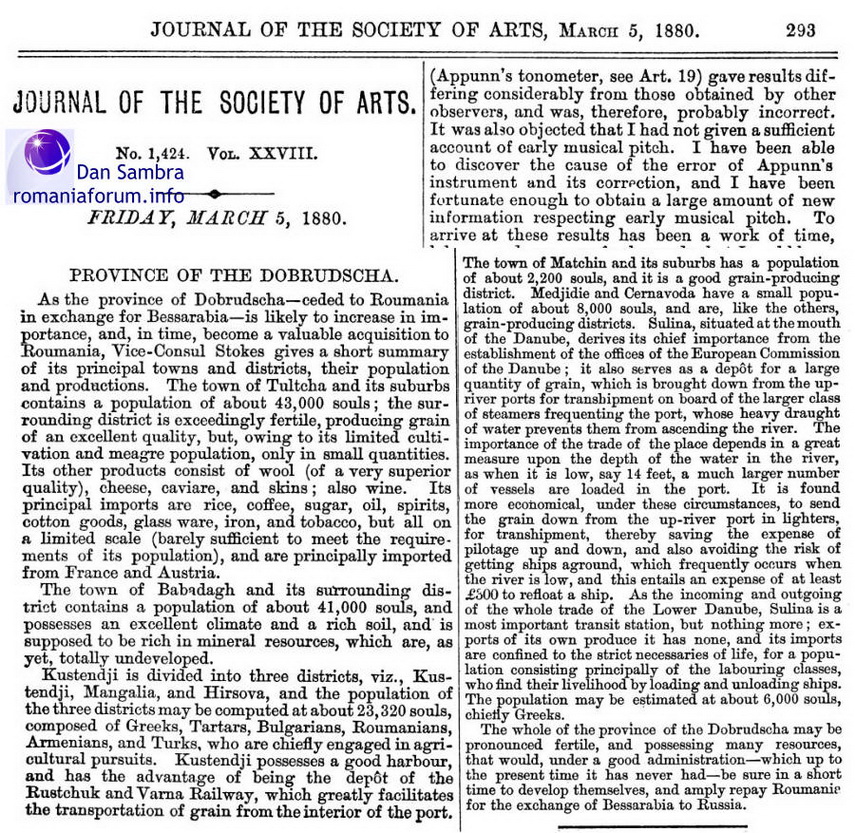
În traducere:
„Vice-consulul Stokes oferă aici o scurtă descriere a principalelor oraşe şi localităţi ale Dobrogei, în acest moment, în care provincia Dobrogea - cedată României în schimbul Basarabei - va creşte probabil în importanţă şi, în timp, va deveni o achiziţie importantă pentru România“.
Descrie apoi Tultcha, Babadagh, Matchin, Medjidie, Cernavodă, Sulina.
Despre Kustendji:
„Kustendji se împarte în trei districte: Kustendji, Mangalia şi Hârşova. Populaţia celor trei districte poate fi considerată la aproximativ 23.320 de suflete: compusă din greci, tătari, bulgari, români, armeni şi turci; care se ocupă în primul rând cu agricultura. Kustendji are un port bun şi are avantajul să depoziteze grânele transportate cu căile ferate de la Varna şi Rusciuc“.
[Cap.3] Prima hartă militară a Dobrogei - după alipirea la România
La sfârşitul Războiului Ruso-Turc din 1877-1878, Dobrogea a fost alăturată României. A avut loc cu acesta ocazie o festivitate la Constanţa, în ziua de 14/27 noiembrie 1878.În Dobrogea erau în acel moment patru biserici creştine: greacă, armeană, catolică şi bulgară; de asemenea, mai multe moschei şi o sinagogă în Constanţa.
La 22 februarie 1878 s-a înfiinţat, la Constanţa, prima unitate militară din nouă provincie; Divizia Activă Dobrogea.
În august 1886 a fost terminată prima harta militară a Dobrogei, apărută în 1887:
- „ridicată pe scala 1:10.000 în anii 1880-1883
- sub Domnia Majestăţii Sale CAROL I, Rege al României
- de Marele Stat Major al Armatei
- reducţiune la 1:200.000
- Bucuresci, 1887“.
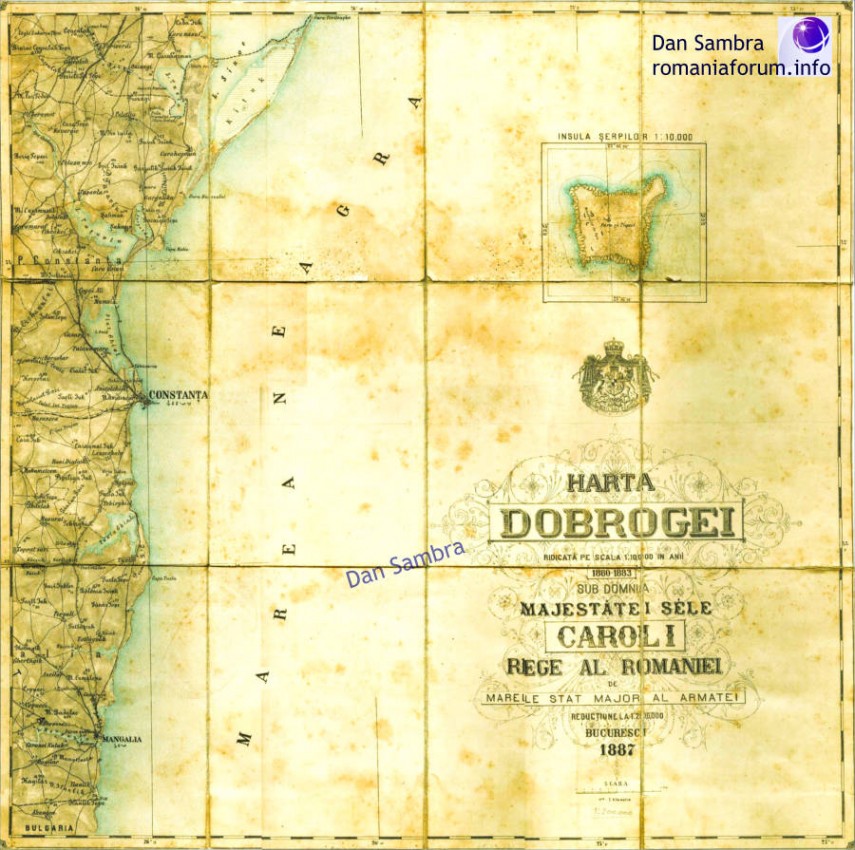
Ridicarea topografică a avut loc între 1880 şi 1883, realizată de Depozitul General de Război, sub conducerea colonelului Constantin Barozzi.
S-a folosit drept model harta Europei, publicată la Viena în 1870 (autor Joseph von Scheda) - şi care arată şi nouă cale ferată Cernavodă - Kustendje.
Detaliu: cartuş şi Dobrogea:
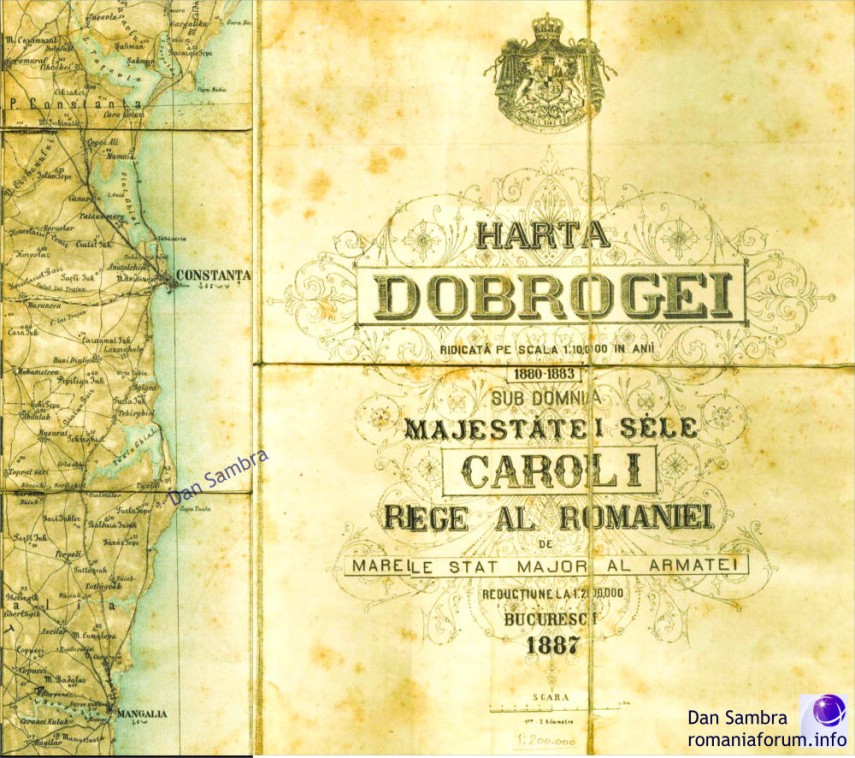
Este una din primele hărţi în care apare numele oraşului „Constanţa“. Câteva texte pe hartă:
- Mamaia
- Tăbăcăria
- Tăbăcaria noue
- M(ovila) Avretiuc
- P(lasa) Constanţa
- Agigea
- etc.
Detaliu: Constanţa:
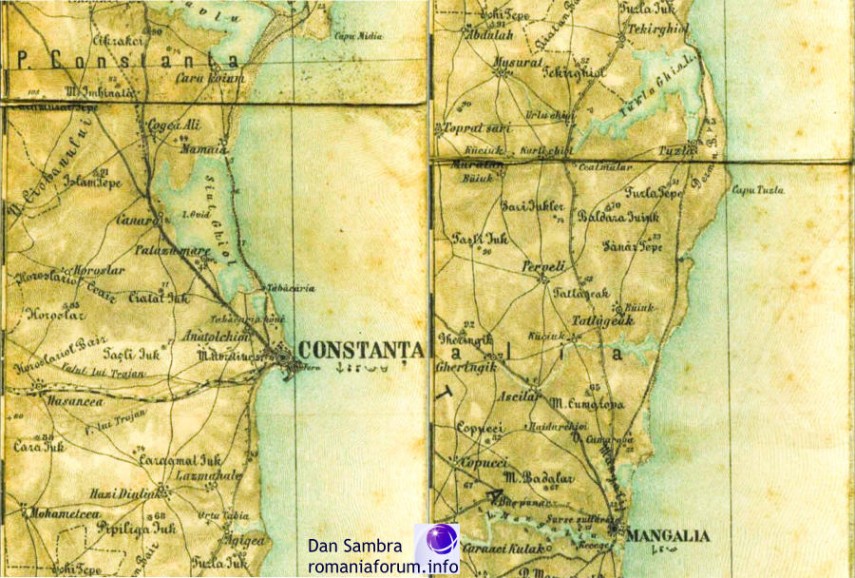
Bibliografie:
[1] „Roumania“. In „The Saturday Review“, November 30, 1878.
[2] „Province of the Dobrudscha“. In „Journal of the Society of Arts“, March 3, 1880.
La mulţi ani, Dobrogea!
La mulţi ani, dobrogeni!
Despre Dan-Eugen Șambra
S-a născut în Constanţa, în martie 1950. A absolvit Liceul „Mircea cel Bătrân“ şi Facultatea de Automatică şi Calculatoare Bucureşti. În august 1986, a emigrat oficial cu familia în Germania, unde a lucrat, până la pensionare, la Siemens AG (din 2004, cu titlul Senior Engineer). A proiectat şi a pus în funcţiune proiecte de automatizare şi software diverse pe patru continente. La începutul anului 2011, a demarat ca administrator un forum despre istoria României / Dunăre / M. Neagră (design & structură proprie) - romaniaforum.info.
facebook.com/Dan.Sambra.1/
facebook.com/Dan.Sambra.2
Citeşte şi:
Dan Şambra şi file de istorie dobrogeanã
DOBROGEA. FILE DE ISTORIEUrmareste-ne pe Grupul de Whatsapp
Comentarii
 Fondul Documentar Dobrogea de ieri și de azi
Fondul Documentar Dobrogea de ieri și de azi




